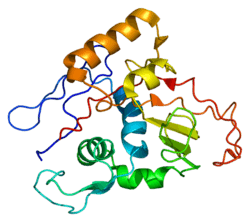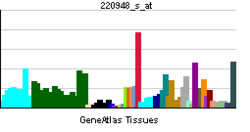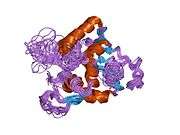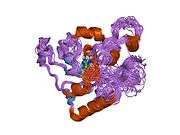ATPase, Na+/K+ transporting, alpha 1
| View/Edit Human | View/Edit Mouse |
| Gastric H+/K+-ATPase, N terminal domain | |||||||||
|---|---|---|---|---|---|---|---|---|---|
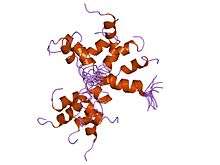 tfe-induded structure of the n-terminal domain of pig gastric h/k-atpase | |||||||||
| Identifiers | |||||||||
| Symbol | H-K_ATPase_N | ||||||||
| Pfam | PF09040 | ||||||||
| InterPro | IPR015127 | ||||||||
| |||||||||
Sodium/potassium-transporting ATPase subunit alpha-1 is an enzyme that in humans is encoded by the ATP1A1 gene.[4]
The protein encoded by this gene belongs to the family of P-type cation transport ATPases, and to the subfamily of Na+/K+-ATPases. Na+/K+-ATPase is an integral membrane protein responsible for establishing and maintaining the electrochemical gradients of Na and K ions across the plasma membrane. These gradients are essential for osmoregulation, for sodium-coupled transport of a variety of organic and inorganic molecules, and for electrical excitability of nerve and muscle. This enzyme is composed of two subunits, a large catalytic subunit (alpha) and a smaller glycoprotein subunit (beta). The catalytic subunit of Na+/K+-ATPase is encoded by multiple genes. This gene encodes an alpha 1 subunit. Alternatively spliced transcript variants encoding different isoforms have been identified.[4]
In melanocytic cells ATP1A1 gene expression may be regulated by MITF.[5]
Clinical relevance
Mutations in this gene have been associated with aldosterone-producing adenomas and secondary hypertension. (PMID 23416519).
References
- ↑ "Drugs that physically interact with Sodium/potassium-transporting ATPase subunit alpha-1 view/edit references on wikidata".
- ↑ "Human PubMed Reference:".
- ↑ "Mouse PubMed Reference:".
- 1 2 "Entrez Gene: ATP1A1 ATPase, Na+/K+ transporting, alpha 1 polypeptide".
- ↑ Hoek KS, Schlegel NC, Eichhoff OM, et al. (2008). "Novel MITF targets identified using a two-step DNA microarray strategy". Pigment Cell Melanoma Res. 21 (6): 665–76. doi:10.1111/j.1755-148X.2008.00505.x. PMID 19067971.
Further reading
- Lingrel JB, Orlowski J, Shull MM, Price EM (1990). "Molecular genetics of Na,K-ATPase.". Prog. Nucleic Acid Res. Mol. Biol. 38: 37–89. doi:10.1016/S0079-6603(08)60708-4. PMID 2158121.
- Dunbar LA, Caplan MJ (2001). "Ion pumps in polarized cells: sorting and regulation of the Na+, K+- and H+, K+-ATPases.". J. Biol. Chem. 276 (32): 29617–20. doi:10.1074/jbc.R100023200. PMID 11404365.
- Wangemann P (2002). "K+ cycling and the endocochlear potential.". Hear. Res. 165 (1-2): 1–9. doi:10.1016/S0378-5955(02)00279-4. PMID 12031509.
- Xie Z, Cai T (2004). "Na+-K+--ATPase-mediated signal transduction: from protein interaction to cellular function.". Mol. Interv. 3 (3): 157–68. doi:10.1124/mi.3.3.157. PMID 14993422.
- Shull MM, Pugh DG, Lingrel JB (1990). "The human Na, K-ATPase alpha 1 gene: characterization of the 5'-flanking region and identification of a restriction fragment length polymorphism.". Genomics. 6 (3): 451–60. doi:10.1016/0888-7543(90)90475-A. PMID 1970326.
- Herrera VL, Ruiz-Opazo N (1990). "Alteration of alpha 1 Na+,K+ATPase 86Rb+ influx by a single amino acid substitution.". Science. 249 (4972): 1023–6. doi:10.1126/science.1975705. PMID 1975705.
- Kawakami K, Ohta T, Nojima H, Nagano K (1986). "Primary structure of the alpha-subunit of human Na,K-ATPase deduced from cDNA sequence.". J. Biochem. 100 (2): 389–97. PMID 2430951.
- Yang-Feng TL, Schneider JW, Lindgren V, et al. (1988). "Chromosomal localization of human Na+, K+-ATPase alpha- and beta-subunit genes.". Genomics. 2 (2): 128–38. doi:10.1016/0888-7543(88)90094-8. PMID 2842249.
- Sverdlov ED, Broude NE, Sverdlov VE, et al. (1987). "Family of Na+,K+-ATPase genes. Intra-individual tissue-specific restriction fragment length polymorphism.". FEBS Lett. 221 (1): 129–33. doi:10.1016/0014-5793(87)80366-6. PMID 2887455.
- Chehab FF, Kan YW, Law ML, et al. (1987). "Human placental Na+,K+-ATPase alpha subunit: cDNA cloning, tissue expression, DNA polymorphism, and chromosomal localization.". Proc. Natl. Acad. Sci. U.S.A. 84 (22): 7901–5. doi:10.1073/pnas.84.22.7901. PMC 299443
 . PMID 2891135.
. PMID 2891135. - Ovchinnikov YuA, Monastyrskaya GS, Broude NE, et al. (1987). "The family of human Na+,K+-ATPase genes. A partial nucleotide sequence related to the alpha-subunit.". FEBS Lett. 213 (1): 73–80. doi:10.1016/0014-5793(87)81467-9. PMID 3030810.
- Shull MM, Lingrel JB (1987). "Multiple genes encode the human Na+,K+-ATPase catalytic subunit.". Proc. Natl. Acad. Sci. U.S.A. 84 (12): 4039–43. doi:10.1073/pnas.84.12.4039. PMC 305017
 . PMID 3035563.
. PMID 3035563. - Sverdlov ED, Monastyrskaya GS, Broude NE, et al. (1987). "The family of human Na+,K+-ATPase genes. No less than five genes and/or pseudogenes related to the alpha-subunit.". FEBS Lett. 217 (2): 275–8. doi:10.1016/0014-5793(87)80677-4. PMID 3036582.
- Ruiz A, Bhat SP, Bok D (1995). "Characterization and quantification of full-length and truncated Na,K-ATPase alpha 1 and beta 1 RNA transcripts expressed in human retinal pigment epithelium.". Gene. 155 (2): 179–84. doi:10.1016/0378-1119(94)00812-7. PMID 7536695.
- Hundal HS, Maxwell DL, Ahmed A, et al. (1995). "Subcellular distribution and immunocytochemical localization of Na,K-ATPase subunit isoforms in human skeletal muscle.". Mol. Membr. Biol. 11 (4): 255–62. doi:10.3109/09687689409160435. PMID 7711835.
- Feschenko MS, Sweadner KJ (1995). "Structural basis for species-specific differences in the phosphorylation of Na,K-ATPase by protein kinase C.". J. Biol. Chem. 270 (23): 14072–7. doi:10.1074/jbc.270.23.14072. PMID 7775468.
- Ruiz-Opazo N, Barany F, Hirayama K, Herrera VL (1994). "Confirmation of mutant alpha 1 Na,K-ATPase gene and transcript in Dahl salt-sensitive/JR rats.". Hypertension. 24 (3): 260–70. doi:10.1161/01.hyp.24.3.260. PMID 8082931.
- Zahler R, Gilmore-Hebert M, Baldwin JC, et al. (1993). "Expression of alpha isoforms of the Na,K-ATPase in human heart.". Biochim. Biophys. Acta. 1149 (2): 189–94. doi:10.1016/0005-2736(93)90200-J. PMID 8391840.
- Wang J, Schwinger RH, Frank K, et al. (1996). "Regional expression of sodium pump subunits isoforms and Na+-Ca++ exchanger in the human heart.". J. Clin. Invest. 98 (7): 1650–8. doi:10.1172/JCI118960. PMC 507599
 . PMID 8833915.
. PMID 8833915.
